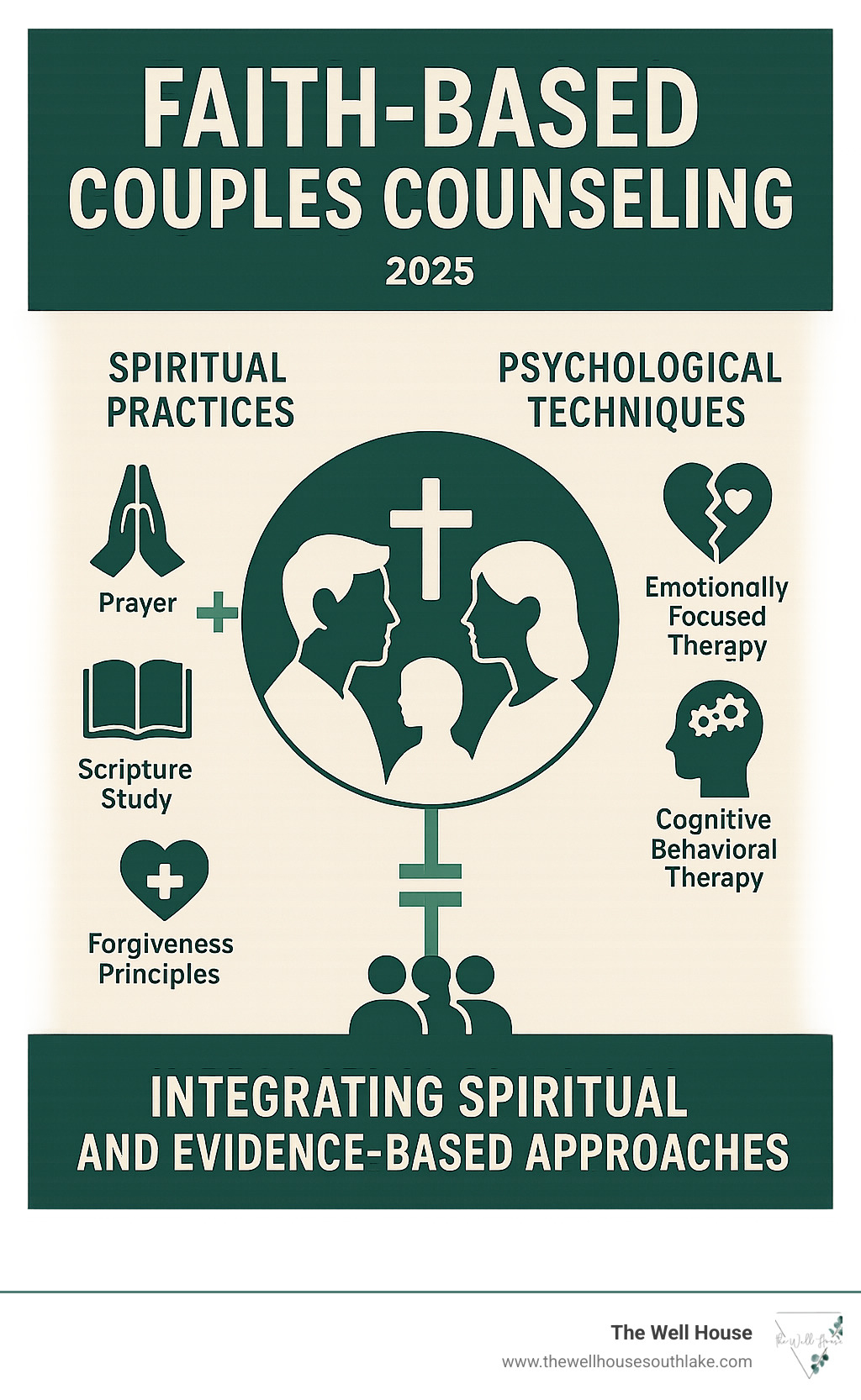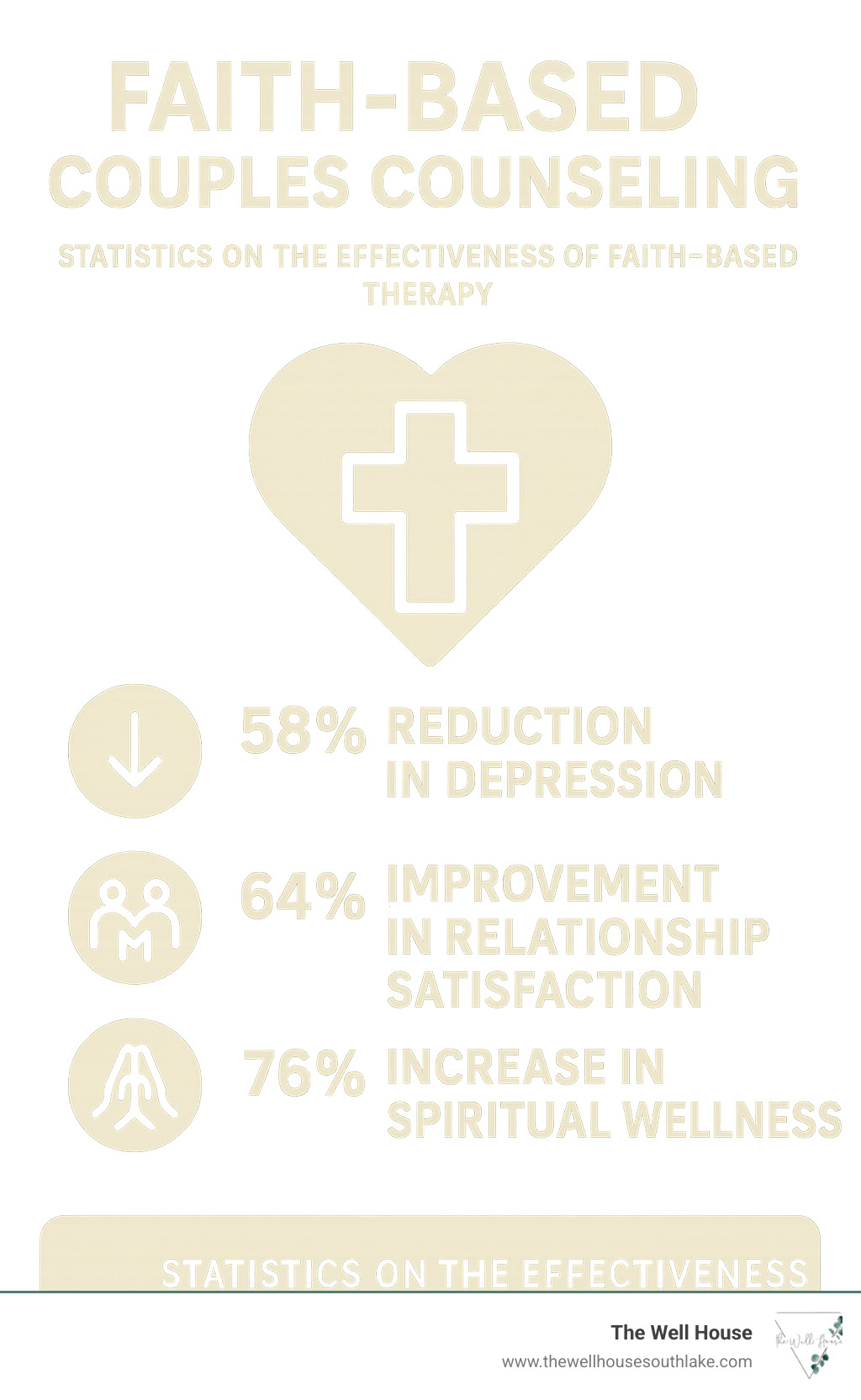Couples Who Pray Together Stay Together: Faith-Based Counseling Explained
Why Faith-Based Couples Counseling Offers a Unique Path to Healing
Faith based couples counseling integrates spiritual principles with evidence-based psychological techniques to help couples strengthen their relationships through shared values and beliefs. Here’s what you need to know:
What it is:
- Professional therapy that combines clinical psychology with Christian principles
- Licensed therapists who incorporate prayer, scripture, and spiritual practices
- Evidence-based methods like EFT, Gottman Method, and CBT within a faith framework
Who it’s for:
- Couples seeking counseling that honors their biblical worldview
- Partners who want to address relationship challenges through their faith
- Those dealing with communication issues, trust problems, or life transitions
How it works:
- Sessions may include prayer, scriptural guidance, and forgiveness principles
- Therapists use both spiritual resources and proven therapeutic techniques
- Focus on healing that addresses mind, body, and spirit
One therapist beautifully described this approach using the analogy of wine and cheese – spirituality and psychology are distinct in origin but combine to create something superior. Just as Christian faith recognizes brokenness and the need for grace, clinical therapy offers tools for narrative integration and self-awareness.
The benefits are significant. Research shows that spiritual community participation may reduce depression and substance use. Many couples find that working with a counselor who shares their faith creates a safer environment for vulnerability and growth.
I’m Jennifer Kruse, a Licensed Professional Counselor Supervisor with extensive experience helping couples integrate their spiritual beliefs with evidence-based therapeutic approaches. My holistic soul-mind-body approach to faith based couples counseling has helped countless couples find healing and renewed connection through their shared faith journey.

Faith based couples counseling vocab explained:
What is Faith-Based Couples Counseling and How Does It Work?

Faith based couples counseling brings together the best of both worlds – professional therapy and spiritual wisdom. Think of it as having a conversation with a skilled counselor who truly understands that your relationship with God is central to your marriage.
This approach recognizes something beautiful: you’re not just a mind that needs fixing or emotions that need managing. You’re a whole person with a mind, body, and spirit connection. When we work together, we’re addressing all three aspects because they’re all connected in your healing journey.
What makes this different from regular therapy? It’s the way we weave your faith naturally into the therapeutic process. Your shared belief system becomes a source of strength, not something we set aside. We’re not doing pastoral care instead of professional counseling – we’re blending them together in a way that honors both your clinical needs and your spiritual values.
The goal is simple: help you build a stronger marriage using both the tools of psychology and the wisdom of your faith. It’s about creating a holistic approach where your spirituality improves the therapy, making it more meaningful and effective for you as a couple.
Marriage Counseling and Couples Therapy
Faith-based couples therapy to improve communication and relationship satisfaction. Schedule today.
The Integration of Spiritual and Psychological Principles
Here’s where things get really interesting. In faith based couples counseling, we don’t just talk about your problems – we bring prayer into sessions when it feels right. Some couples tell us they don’t want to leave because they feel God’s presence so strongly in the room.
Scripture becomes a living guide rather than just words on a page. When you’re struggling with forgiveness, we might explore what the Bible says about grace and redemption. When communication breaks down, we can look at passages about love and patience together. It’s not about preaching – it’s about finding wisdom that speaks to your heart.
The forgiveness principles we work with go deeper than just “letting it go.” We explore Biblical concepts of grace, mercy, and the possibility of true restoration. Research shows that couples who apply these spiritual principles often find healing that goes beyond what psychology alone can offer.
But here’s the key: we’re not replacing good therapy with spiritual platitudes. We’re using evidence-based modalities like Emotionally Focused Couples Therapy (EFT), the Gottman Method, and Cognitive Behavioral Therapy (CBT) – all within a framework that honors your faith.
For example, when we use EFT techniques to help you reconnect emotionally, we might also pray for God’s healing in your relationship. When we apply Gottman principles about building friendship in marriage, we can connect that to Biblical teachings about love and companionship. It’s therapy that speaks your language.
What a Typical Session Might Look Like
Walking into our office, you’ll find a warm, welcoming space where you can be completely yourself. We start with an initial assessment where we get to know your story – both your relationship history and your faith journey. This isn’t just about problems; it’s about understanding what makes you tick as a couple.
Goal setting happens together. Maybe you want better communication, or you’re working through a trust issue, or you simply want to grow deeper in your connection. We’ll talk about what success looks like for you, both relationally and spiritually.
During open dialogue, we create space for honest conversation. This might feel scary at first, but many couples are surprised by how safe it feels to be vulnerable when their faith is part of the process. We might begin with guided prayer if you’re comfortable with that, asking God to be present as we work together.
Scripture application isn’t about finding a verse to fix everything. It’s about finding how God’s wisdom applies to your specific situation. Sometimes a passage will speak directly to what you’re facing, bringing comfort or clarity in ways that surprise you.
We’ll give you homework assignments that blend practical relationship skills with spiritual practices. This might include prayer exercises for couples, scripture study that relates to your challenges, or practicing forgiveness techniques in your daily life.
The most important thing we’re doing is building a therapeutic alliance – a partnership where you feel understood and supported. We’re not just your counselors; we’re fellow travelers on the faith journey, committed to helping you foster deeper connection with each other and with God.
Why Choose Faith-Based Counseling Over Traditional Therapy?

When you’re sitting across from a counselor, sharing your deepest struggles and hopes for your marriage, wouldn’t it be wonderful if they truly understood the foundation of your relationship? That’s exactly what faith based couples counseling offers – a therapist who doesn’t just tolerate your faith, but celebrates it as a source of strength and healing.
Many couples tell us they chose faith-based counseling because they were tired of feeling like they had to hide or minimize their beliefs. When your faith is central to who you are, working with someone who shares that worldview creates an immediate sense of safety and understanding. You don’t have to explain why you pray together or why forgiveness means more to you than just “moving on.”
The research backs up what couples experience firsthand. Studies show that spiritual community participation can reduce depression and substance use while potentially increasing life expectancy. When you engage in faith based couples counseling, you’re not just addressing relationship challenges – you’re strengthening the spiritual wellness that impacts every area of your life.
There’s something powerful about having a counselor who understands that your marriage isn’t just a partnership – it’s a sacred covenant. They get why you want to work through problems rather than give up, and why concepts like grace, redemption, and sacrificial love aren’t just nice ideas but practical tools for healing.
Key Differences from Secular Couples Therapy
While both approaches want to help couples thrive, they start from completely different places. Faith based couples counseling sees God’s Word as the ultimate source of truth about relationships, while secular therapy relies primarily on psychological research and human wisdom. It’s not that one approach is wrong – they’re just designed for different people with different worldviews.
| Aspect | Faith-Based Counseling | Secular Counseling |
|---|---|---|
| Source of Truth | Scripture and clinical research | Psychological research and theory |
| Role of God | Central to healing process | Not typically addressed |
| Methods | Prayer, scripture, forgiveness + EFT, CBT, Gottman | Primarily psychological techniques |
| Moral Framework | Biblical principles guide decisions | Personal values and societal norms |
| View of Marriage | Sacred covenant ordained by God | Partnership between two individuals |
| Approach to Forgiveness | Grace-based, redemptive process | Psychological healing and boundaries |
In secular therapy, the focus is typically on self-exploration, communication skills, and behavioral changes. These are valuable tools, but they often address what one counselor described as “body and soul” while stopping short of connecting with your spirit. Faith-based counseling adds that crucial spiritual dimension, recognizing that God plays an active role in your healing process.
The moral framework creates another significant difference. Faith-based counselors operate within biblical principles about marriage, sexuality, and relationships. They’re not imposing rules on you – they’re helping you live out the values you already hold dear. Secular therapists generally avoid making moral judgments and focus on what works for each individual couple, regardless of broader moral considerations.
Common Issues Addressed in Faith-Based Couples Counseling
The beautiful thing about faith based couples counseling is that it can address virtually any relationship challenge while viewing each issue through both psychological and spiritual lenses. Your struggles don’t become less real because you have faith – they just get addressed with more resources.
Communication breakdown is probably the most common issue we see. We help couples learn to “speak truth in love” as Ephesians teaches, while also practicing active listening and using “I” statements to avoid blame. It’s not just about better communication techniques – it’s about communicating in ways that honor God and each other.
When couples face conflict resolution challenges, faith adds a whole new dimension. Instead of just finding compromise, you learn to seek God’s wisdom together, practice biblical submission and sacrificial love, and view conflict as an opportunity for spiritual growth. Suddenly, disagreements become chances to grow closer to God and each other.
Infidelity and trust issues are devastating, but faith-based counseling offers unique resources for healing. The concepts of confession, repentance, forgiveness, and restoration provide a framework for rebuilding trust that goes far beyond secular approaches. It doesn’t make the process easier, but it makes it more hopeful.
Financial stress can tear couples apart, but biblical principles of stewardship, contentment, and trusting God’s provision offer a different perspective. We combine practical budgeting and communication skills with spiritual practices that help you find peace regardless of your bank account balance.
Intimacy and sexual issues are approached within God’s design for marriage, helping couples understand sexuality as a gift from God while addressing practical concerns about desire, satisfaction, and physical challenges. Your faith doesn’t make these conversations awkward – it makes them sacred.
Parenting disagreements can be resolved by establishing shared values based on biblical principles while learning effective co-parenting strategies. Premarital counseling helps engaged couples build their relationship on a strong foundation of faith. Life transitions like job changes, moves, or health challenges are viewed through the lens of God’s sovereignty and purpose, helping couples steer change together.

How to Find a Qualified Faith-Based Counselor

Finding the right faith based couples counseling professional might feel like searching for a needle in a haystack, but it doesn’t have to be overwhelming. The key is knowing what to look for and asking the right questions. Think of it as finding a trusted friend who happens to be professionally trained to help couples thrive.
Your first decision is whether you prefer in-person or online counseling. The world has changed dramatically, and telehealth options have made quality faith based couples counseling accessible regardless of where you live. Many couples in Southlake, Westlake, Grapevine, Roanoke, and Trophy Club find that online sessions offer the same warmth and connection as face-to-face meetings, with added convenience.
Here’s an encouraging statistic: 63% of people seeking online counseling identify as Christian. This means there’s a growing community of faith-based professionals ready to serve couples who share their values. The challenge isn’t finding options – it’s finding the right fit for your unique situation.
At The Well House, we understand that making an informed choice about your counselor is crucial. You’re not just hiring a service provider; you’re inviting someone into your most personal space. Taking time to vet potential counselors isn’t being picky – it’s being wise.
Qualifications and Training to Look For
When you’re evaluating potential counselors, state licensure should be your starting point. Look for credentials like Licensed Professional Counselor (LPC), Licensed Marriage and Family Therapist (LMFT), or Licensed Clinical Social Worker (LCSW). These aren’t just letters after a name – they represent years of graduate education, thousands of hours of supervised practice, and passing comprehensive examinations.
Many faith-based counselors also hold seminary degrees or specialized biblical counseling training. Some have certifications from organizations like the Association of Biblical Counselors or the Professional Association of Christian Counselors. While these aren’t required, they show a counselor’s commitment to thoughtfully integrating faith with clinical practice.
Don’t forget about specialized training in couples therapy. The most effective faith-based counselors combine spiritual wisdom with proven therapeutic approaches like Emotionally Focused Therapy, the Gottman Method, or Prepare/Enrich premarital counseling. This combination creates a powerful foundation for healing and growth.
Clinical experience matters tremendously. A counselor who has walked alongside hundreds of couples through their darkest moments and brightest breakthroughs brings invaluable wisdom to your sessions. Ask about their years of practice and how many couples they’ve helped. Experience teaches lessons that textbooks simply can’t.
Integrate Faith into Your Relationship Counseling
Contact our Southlake therapists for faith-based couples counseling and strengthen your bond.
Questions to Ask a Potential Counselor
Before committing to faith based couples counseling, have a genuine conversation with potential counselors. This isn’t an interview – it’s more like getting to know someone who might become an important part of your journey.
Start with the integration question: “How do you integrate your faith with your clinical practice?” Their answer will reveal whether they truly blend spiritual and psychological approaches or just add prayer to the beginning of sessions.
Ask about their specific training and experience with couples. You want someone who understands the unique dynamics of marriage, not just individual therapy. Their response should demonstrate both clinical expertise and genuine enthusiasm for helping couples.
Explore their theological perspective on marriage, divorce, and forgiveness. While you don’t need identical beliefs, you want someone whose worldview aligns enough with yours to provide meaningful guidance. This conversation helps you gauge whether you’ll feel understood and supported.
Verify their licensing status by asking directly: “Are you licensed to practice in this state?” This protects you and ensures you’re working with someone who meets professional standards.
Request a description of their typical session. This helps you understand their style and whether it matches your preferences. Some counselors are more directive, while others take a gentler approach.
Address potential belief differences by asking: “How do you approach issues where our beliefs might differ from yours?” A skilled counselor should be able to work respectfully within your belief system while offering professional guidance.
The therapeutic alliance – that sense of safety, being known, and feeling accepted – is one of the most important factors in successful counseling. Pay attention not just to their answers, but to how they make you feel during your conversation.
Important Considerations for LGBTQIA+ Couples
Finding affirming faith based couples counseling as an LGBTQIA+ couple requires extra care and courage. Many traditional faith-based counselors may not be affirming of LGBTQIA+ relationships, making it crucial to ask direct questions before beginning counseling.
Look for counselors who explicitly state they are LGBTQIA+ affirming, not just “welcoming.” There’s a meaningful distinction here. Welcoming might mean they’ll see you as clients but may still view your relationship as problematic. Affirming means they fully support and celebrate LGBTQIA+ relationships as blessed expressions of love.
Ask potential counselors directly about their stance. Questions like “Are you affirming of LGBTQIA+ relationships and identities?” and “How do you reconcile your faith with support for LGBTQIA+ couples?” will help you understand their position clearly.
Inquire about their theological perspective on same-sex relationships and whether they’ve received specific training in LGBTQIA+ issues. Some counselors have found ways to integrate progressive theology with clinical practice, viewing God’s love as inclusive and affirming of all relationships built on love, commitment, and mutual respect.
Consider asking for references from other LGBTQIA+ couples they’ve worked with, if they’re able to provide them while maintaining confidentiality.
If you can’t find an affirming faith-based counselor in your area, you might consider working with an LGBTQIA+ affirming secular counselor who respects your faith, or seeking spiritual guidance separately from a progressive religious leader while working with a qualified couples therapist.
Safety and acceptance are paramount. You deserve counseling that honors both your faith and your relationship without asking you to choose between them. The right counselor will celebrate both aspects of who you are.
Insurance & Payment Options at The Well House Southlake
At The Well House Southlake, we believe your shared faith and relationship both deserve professional support — without financial barriers. That’s why our faith-based couples counseling is designed to include marriage counseling that takes insurance and offers options to make meaningful growth affordable.
We currently accept:
- Blue Cross Blue Shield (BCBS)
- Aetna
- UnitedHealthcare (UHC)
- Self-Pay and Out-of-Network Options
If you’re interested in counseling that takes insurance or want help verifying your benefits, our team is ready to guide you step by step. From confirming your coverage to scheduling sessions, we make the process transparent so you can focus on deepening your connection and growing together.
Conclusion: Taking the Next Step in Your Journey Together
When you’re facing relationship challenges, it can feel overwhelming to know where to turn. But here’s what I’ve learned after years of helping couples: faith based couples counseling isn’t just another form of therapy – it’s a pathway that honors everything you hold dear while giving you practical tools to build the marriage you’ve always wanted.
The beauty of this approach lies in how it recognizes that your faith isn’t separate from your relationship – it’s woven into every aspect of who you are as a couple. When you work with a counselor who understands that your spiritual beliefs matter, something powerful happens. You don’t have to choose between getting professional help and staying true to your values.
The benefits speak for themselves. Couples who participate in faith-based counseling often experience improved communication, stronger conflict resolution skills, and a deeper spiritual connection. Research consistently shows that couples who share spiritual practices and values tend to have more stable, fulfilling marriages. But beyond the statistics, what matters most is how you’ll feel when you can finally talk to each other without it turning into an argument, or when you refind the joy that brought you together in the first place.
I know that taking the step to seek counseling requires courage. There’s often a voice that whispers, “We should be able to figure this out ourselves” or “What will people think?” But here’s the truth: seeking help is one of the most loving investments you can make in your relationship. It shows that your marriage matters enough to fight for it.
At The Well House, we’ve seen countless couples transform their relationships through our holistic approach that combines clinical expertise with spiritual wisdom. Whether you’re dealing with communication breakdowns, trust issues, financial stress, or simply want to strengthen your bond before problems arise, we create a safe space where you can explore your challenges and find new possibilities for growth and connection.
Your relationship deserves this kind of care. You deserve to work with counselors who understand your values and can guide you using both professional skills and the spiritual insights that already provide meaning in your life. Whether you’re here in Southlake, Westlake, Grapevine, Roanoke, Trophy Club, or anywhere in Texas through our telehealth services, we’re ready to support your journey toward a stronger, more fulfilling marriage.
Don’t wait for small problems to become big crises. Just as you wouldn’t ignore chest pains and hope they go away, your relationship deserves attention before things reach a breaking point. Your marriage counseling journey can begin today, and it starts with a simple phone call or email.
The path to healing and deeper connection is right in front of you. Take that first brave step by reaching out to explore how faith based couples counseling can strengthen your relationship while honoring the spiritual foundation that matters most to you. Your marriage is worth the investment, and with the right support, you can build the strong, faith-filled relationship you both long for.











